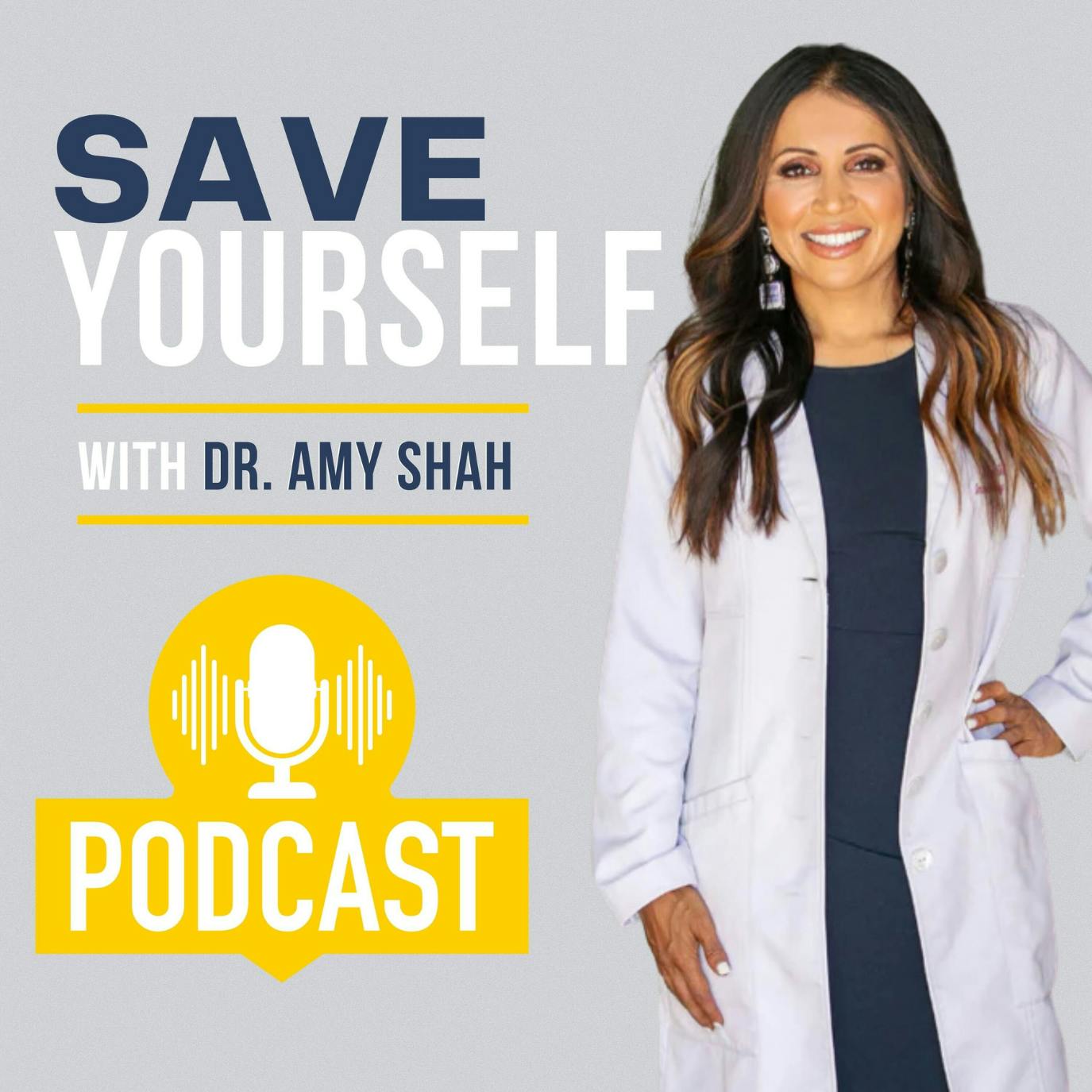.jpg)
Mindfully Integrative Show
Welcome to the Mindfully Integrative Podcast! We are dedicated to featuring inspirational and successful individuals who have embraced mindful investing to achieve optimal integrative wellness. Our podcast delves into all aspects of mindfully incorporating integrative functional health into our lives, aiming to help create a more balanced and fulfilling life. New episodes are released every Friday and cover a wide range of informative and entertaining topics, interviews, and discussions. We explore a mindful approach to mind-body and integrative holistic health, including whole health, functional medicine, integrative health, spiritual health, financial health, mental health, lifestyle health, mindset shift, physical health, digital health, nutrition, gut health, sexual health, body love, family health, pet health, business health, and life purpose, among others.
Dr. Damaris G. is an Integrative Doctor of Nurse Practice, a Family Nurse Practitioner, a mom, and a veteran. For collaboration, interviews, or to say hi, you can contact her via email at damaris@mindfullyintegrative.com. You can also find her on LinkedIn at or https://www.linkedin.com/in/damarisdnp/. To join our membership and access resources, visit our website at https://mindfullyintegrative.com . For appointments, you can reach out via text or call at 732-355-3469.
Please note that the information shared here is for informational and educational purposes only and should not be considered medical advice. Always consult with a physician or other licensed healthcare provider when making healthcare decisions. Enjoy the podcast!
Mindfully Integrative Show
Chewing on Health How Fiber Fuels Your Metabolic Engine
Unlock the hidden powers of dietary fiber with Damaris Mayer-Grossman as she guides us through the maze of soluble versus insoluble fiber, and reveals how they hold the keys to our metabolic health. Ever wondered why an apple trumps a candy bar? Damaris dishes out the facts with a zesty blend of science and practicality, dishing on how nature's sweet treats coupled with fiber can satisfy our cravings and nurture our gut's bustling community.
Prepare to be bowled over by the revelation of just how much undigested waste we carry around, with Damaris making an unapologetically blunt PSA: the truest detox is a daily poop, thanks to fiber. This chat is an enlightening tour through our digestive tract, emphasizing the critical role of regular bowel movements in detoxification and overall well-being. By the time you've finished listening, you'll be eyeing that fruit bowl and whole grains with newfound respect, ready to chomp your way to a healthier you, one fiber-rich bite at a time.
Are you feeling stressed, tired, or Metabolism imbalanced?
Take advantage of our free mindful steps to help improve your well-being.
ENJOY ONE OF our Books
Mindful Ways Health Wealth & Life
https://stan.store/Mindfullyintegrative
Ask Us for help with Medical Weight Loss & Improve Metabolic Health
Www.mindfullyintegrative.com
Let's Work on Your Optimal Wellness Journey!
Sign Up For Discovery Call
https://stan.store/Mindfullyintegrative
Enjoy the Show and Get Bonus Episodes
Subscribe For Just $4 a month
Enjoy one of Our Mindful Book Collections HERE
Check Out our YouTube Channel
Join Our Mindfully Integrative Private Facebook Community
Get 15% off Pharmaceutical Grade...
Hi, how are you? This is Damaris Mayer-Grossman, and we're doing a series on vitamins and minerals and ways of getting nutritional value and things that are necessary in the body, whether it's in a supplement form, and really the most natural form is getting things eating. You know what you put into your body and not just having to take a supplement. So then the goal is, you know, eat your way to better health, not, you know, just take something. The reason the supplements are available for people is because they're just not getting the right amount of nutritional value vitamins, minerals or what have you to get the needs I'm talking about today dietary fiber. So why do we need dietary fiber? What are the benefits of dietary fiber and is there good, bad and what would you recommend? So let's talk about dietary fiber. There is soluble versus insoluble. So ways of soluble is things that are like apples, that contain soluble fiber, like the peel, but that's insoluble. So things that are absorbed through water and things that are not. So when it's not absorbed through water, and soluble and things that are soluble, they kind of make you more fuller.
Speaker 1:Now, why is it important to have quality amounts of soluble fiber? It helps decrease, you know, absorption of dietary sugars and fats. It helps with your overall digestion. So I mean the GI tract starts from when you start chewing your food all the way down out to it going into the toilet. So chewing your food mindfully, eating these fibrous foods to help push and clear out any of the excess. The insoluble fibers help promote regular bowel movements, prevent constipation, you know, softening and adding bulk to the stool as needed. It helps balance sugar levels. You know the fiber, the soluble fiber, will slow down the absorption of sugar. It will stabilize your levels and is really really important for metabolic health and like it's so interesting. So some people are like, oh, if I just, you know, eat healthy. Eat healthy, you know, just having quality amounts of dietary fiber within the body, you know, and when your body is craving sugar, I'd rather you go for that apple, because you can get the sugar from the apple and also the fiber from the apple, than going for that candy bar. And you're still promoting really good health and still kind of passing through things to help promote better microbiome and better prebiotic and probiotic health so that it benefits and thrives within the microbiome. Because the microbiomes, yeah, you know your good bacteria, bad bacteria, viruses, your fungal, you know it's like a big colony of things that symbiotically and you know work together. So that's nice and balanced and it really puts you in such a great um way of um your body to kind of like get it all out.
Speaker 1:You know, you could have literally 10 to like 15 pounds of poop sitting in you and when someone's like oh wow, I'm overweight, I'm inflamed, sometimes there's inflammation there, but sometimes it's like literally you're full of poop and you might not even realize it, you get some of that out. And you got to go regularly. I got to tell you you know my PSA public service announcement for this one is I got to tell you you know my PSA public service announcement for this one is you know, detoxification is actually pooping. So you may not know it yet, but when you clean your GI tract out and you go to the bathroom once a day it's at a minimum, and if you're not going there's a problem. You're not detoxifying and dietary fiber helps with that. That's a big part, you know.
Speaker 1:What I'm saying is that you know it's really necessary. The soluble fiber dissolves in water, the insoluble fiber does not. They're both very important, they're both needed. So you get that really kind of when you're doing more fruits and veggies, mostly like apples, like a great one. Like I said, the peel from the apple is insoluble, does not, will not absorb, I kind of.
Speaker 1:Another way of looking at it is, you know, when you're juicing and you've got all that pulp and you've got the juice. So the juice is the soluble way of juices and all that pulp is still really necessary. So I'm not necessarily a big fan of just juicing. I'd rather you do a smoothie because in that aspect you've got the insoluble food, um pulp going through and helping you push through and get, you know, all that excess from the intestinal walls and then the um soluble will help you absorb and bring in the nutrients. So I'm more of a fan of you doing more smoothie kind of realm, unless you have, like a Crohn's initial, that you may need to have more of a gentle fiber in the body Because you really want to lower the fiber content because sometimes it could be a little bit inflaming for some individuals.
Speaker 1:So you know it. Just that has to be considered because you really got to find out root cause. So if you do have some inflammatory processes we have to find out what you can take and tolerate. Maybe that's just small bites of it. So sometimes people that are constipated, sometimes they have an infection, they have mold toxicity or stress, anxiety or depression, but if they look, or they even have their microbiome like dysbiosis, where those connections within the stomach wall is irregular and it's flushing out, so the fiber is not really working to the benefit.
Speaker 1:Obviously, if you do need to take supplements, there are options. But initially let's talk about ways to get dietary fiber into our diet. Oats, grains, black beans, beans, those any of the bean families, usually apples, avocados, tofu, anything in the realm of like a lot of veggies will you know, push things out. Turnips, peas, anything that will get your body into the right direction. Sweet potatoes, that's you know really good ways of just like getting your food out. Brussels sprouts, things of that nature. See what you tolerate and what's good for you that nature. See what you tolerate and what's good for you.
Speaker 1:Now, supplement-wise, I do like Thorne Fiber. Mend Pure Encapsulation has a nice quality, pure, lean fiber, and Garden of Life also has another good option. There's a couple of other ones out there that I've used. So I mean the big effects when you're having more fiber into your diet is see if there's a couple of other ones out there that I've used, you know. So I mean, the big effects when you're having more fiber into your diet is, you know, see if there's anything else underlying.
Speaker 1:Make sure you're hydrating properly with the proper water and electrolytes for your body, because you know, when you're putting in more fiber, you know you don't want to be backed up because you haven't given yourself the amount of absorption there and you're getting in the nutrients that are needed. So things to boost it again, like I've said, you know apples, artichokes, greens, avocados, brussel sprouts, chia seeds, you name it. I'll talk about it, but you know. And then balancing out the fluids within your body. So I'm not going to say you have to have half of your body weight in water, but about 64 ounces of water give or take, and you know, splashing some salt in there to get some electrolytes or an electrolyte drink. This is your talk today about dietary fiber. If you have any questions, reach out to me at any time and make sure you make your day a mindful one. Have a good day.






